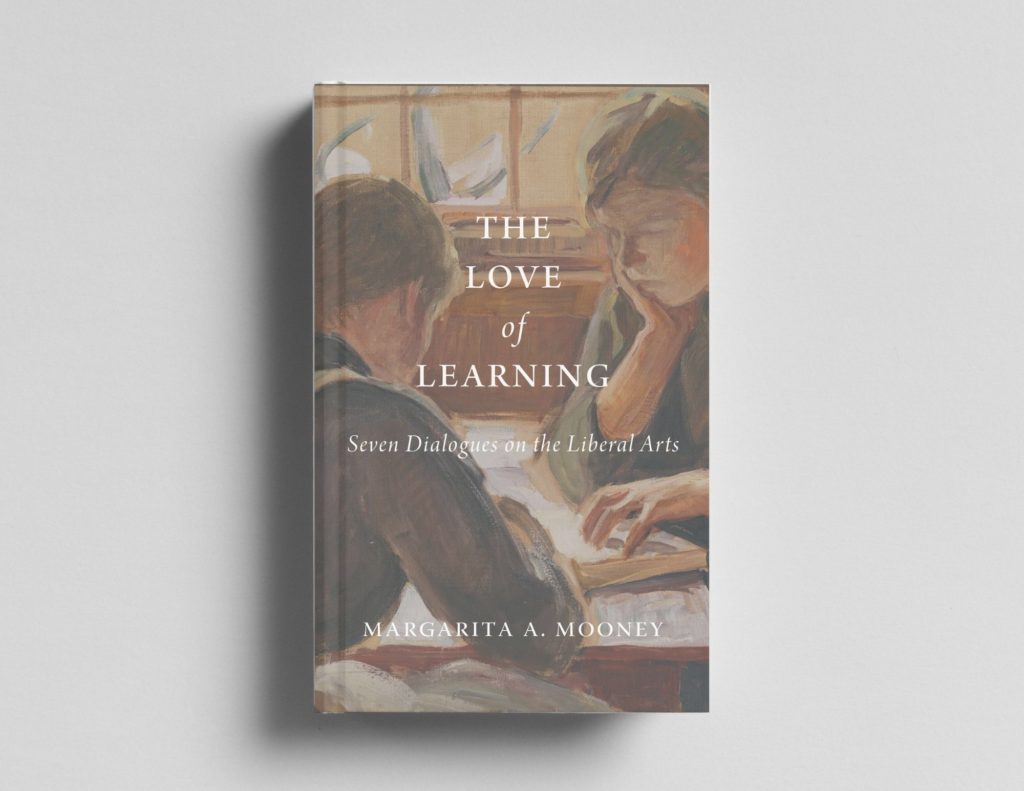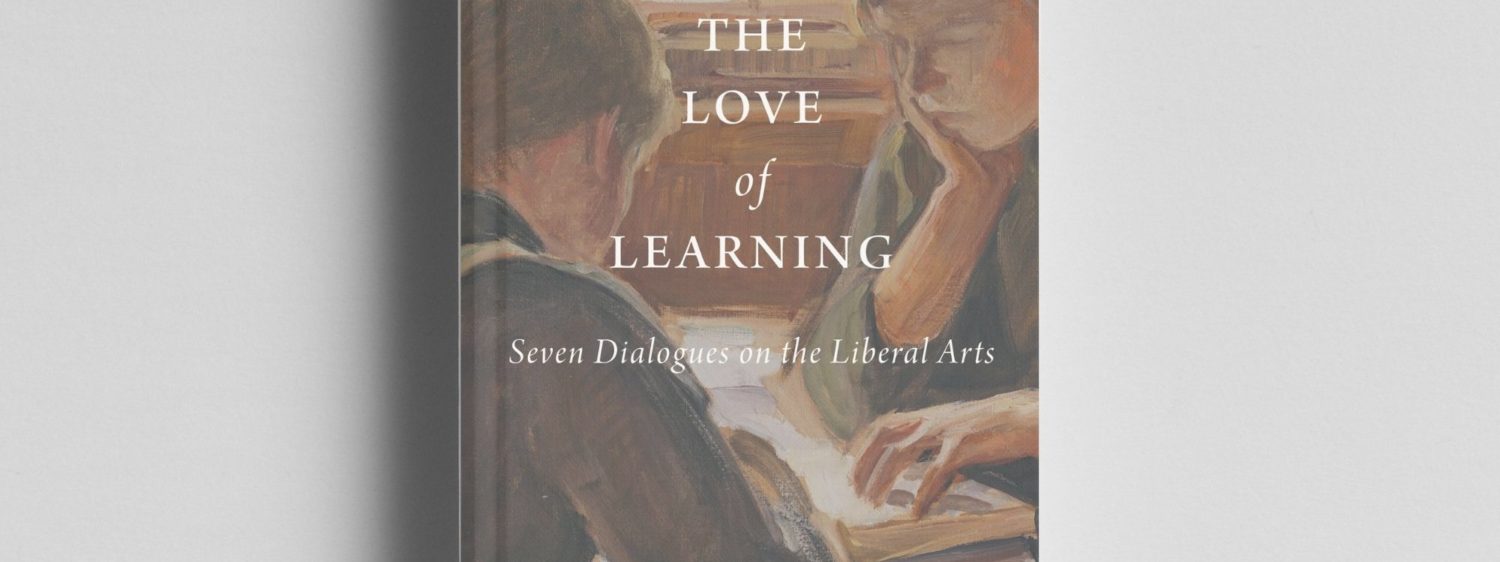by Margarita Mooney Clayton on June 15, 2021

Available for Purchase TODAY!
For group discounts, email [email protected]
What People Are Saying About The Love of Learning
“The impediments to a liberating education in our day and age are many, but Margarita Mooney has recast our challenges as tremendous opportunities for a revival of a genuinely humanizing education. The Love of Learning: Seven Dialogues on the Liberal Arts is not merely a case for restoration, it is a deeply enriching exemplification of what such a restoration looks like.”
–Jonathan J. Sanford, President and Professor of Philosophy, University of Dallas
“Presented as a series of pedagogical dialogues between scholars, this book is not merely a conversation about the liberal arts, it exemplifies the liberal arts as conversation.”
–James Bernard Murphy, Professor of Government, Dartmouth College
Exemplifying Excellence in Education
The Love of Learning tells the stories of how seven renowned scholars fell in love with learning. The Love of Learning invites readers to join the long, ongoing conversation about truth, goodness, and beauty that has its roots in the beginning of Western civilization and is still, as these contributors show, alive and vibrant today. Through examples of people who have pursued excellence through liberal arts education, this book explores the key ideas and thinkers who shape the way we think about and practice education. The chapters of the book emerged from webinar dialogues between Margarita A. Mooney and the contributors about why and how they practice the liberal arts tradition of teaching. The rich conversations in The Love of Learning show how the liberal arts tradition of learning can make each of us more fully human — and our culture more humane.
Seven Stories about the Liberal Arts
In the first chapter, Professor Mooney discusses with Princeton University Professor of Jurisprudence Robert P. George his journey from childhood in West Virginia to the elite college classrooms where he learned to ask why things are as they are, not just how things work. They explore the importance of tradition in education, along with a lesson Professor George learned from his mother and best teachers: think for yourself.
In Chapter 2, Professor Mooney explores with Stanford University Professor of Education William Damon how his early experiences with moral exemplars in impoverished communities led him to conduct psychology research on moral education in order to develop a vision for integral, transformative education.
In dialogue with Professor Elizabeth Corey of the Politics Department and Honors College at Baylor University, Chapter 3 explores Professor Corey’s early love of music and how that led her to fall in love with the holistic foundations of a liberal arts education. In her teaching, she leads students beyond the achievement culture so they can form authentic friendships, pursue the truth in community, and learn to love learning again.
Timothy P. O’Malley, Director of Education at the McGrath Institute for Church Life at the University of Notre Dame, explores with Professor Mooney in Chapter 4 his own discovery of the contemplative aspect of experiential education. Experiential education at its best is fully personal—one’s immersion in the world can be the doorway to transcendence and lived tradition.
Chapter 5 is a dialogue with Carlo Lancellotti, Mathematical Physicist at the City University of New York in Staten Island. Coming of age during the student protests in Italy in the 1960s, Professor Lancellotti discusses with Professor Mooney how his encounter with the Benedictine tradition allowed him to discover the beautiful, awe-inspiring aspects of scientific inquiry. As a practicing scientist, he shares with students the presence of poetic truth in the material world.
George Harne, Executive Dean of the School of Arts and Sciences at the University of St. Thomas in Houston, describes in Chapter 6 how his love and talent for music led him to become the first in his family to attend college. This love led him to incorporate the fine arts and questions of beauty into a holistic educational curriculum that unites science, experiential learning, and worship––education that has the capacity to transform all kinds of students.
Chapter 7 is a dialogue with Professor Roosevelt Montás, the former director of Columbia University’s Core Curriculum and Senior Lecturer in American Studies and English at Columbia. Professor Montás shares with Professor Mooney how, as a teenage immigrant to New York City from the Dominican Republic, he learned that the Great Books transcend particular experiences and speak to fundamental human questions. His teaching continues to unite students from different backgrounds in a common journey of truth-seeking.
Across each of the chapters, Professor Mooney shares bits of her own story as a Cuban-American woman seeking to integrate her love of learning with her Catholic faith. Each chapter guides readers to continue their own life-long learning by suggesting readings from key texts from authors old and new, from Plato, Aristotle and Augustine, to John Henry Newman, Jacques Maritain and Luigi Giussani. The book concludes with numerous practical suggestions on pursuing a liberal arts education at any stage in life, including a guide for discussion groups, and points readers toward numerous popular publications which connect the love of learning to our contemporary culture.
Recovering Excellence in Education is a Universal Calling
“For free human beings who are each unique and called to excellence in different ways, there can be no purely technocratic, scientistic, or entirely skills-based education…Any purposeful human life must consider and respond to the fundamental question of who we are as humans.”
–from the “Conclusion” to The Love of Learning
ABOUT THE AUTHOR
Margarita A. Mooney, Ph.D., is an Associate Professor at Princeton Theological Seminary. She received her B.A. in Psychology from Yale University and her M.A. and Ph.D. in Sociology from Princeton University. Professor Mooney’s work has appeared in publications such as Real Clear Policy, Scientific American, First Things, Hedgehog Review, Public Discourse, Church Life Journal and the Chronicle of Higher Education. Professor Mooney is the founder and executive director of Scala Foundation. Visit her website to see her publications and her YouTube channel for videos.
ABOUT SCALA FOUNDATION
Scala is a movement of students and teachers who are committed to the transformative power of liberal arts education. We believe in the ancient vision of the liberal arts as a shared adventure in learning: open to all, practiced in friendship, and steered towards transcendent truth. Scala offers intensive seminars, reading groups, conferences, webinars, and resources like this book to help people understand the full power of education for themselves and society. To learn more, visit scalafoundation.org and subscribe to Scala’s YouTube channel, where you will find the webinars that launched this book and more videos on liberal arts!
